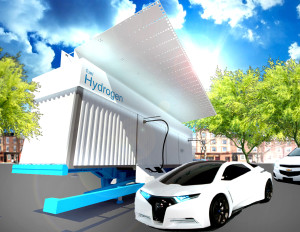By Ethan Nash, Voiland College of Engineering & Architecture Intern
 |
| A rendering of the hydrogen gas station that WSU students designed last year and for which they won an international competition. |
PULLMAN, Wash. – Washington State University students will spend the next year designing what they hope will be the world’s best hydrogen fueling station for a chance to win $1 million – and to change the world.
Led by Jacob Leachman, assistant professor in WSU’s Voiland College of Engineering and Architecture, the student team is competing in the U.S. Department of Energy’s H2 Refuel H-Prize competition.
Designs are due in October, and winners will be announced in October 2016. Leachman is looking for students and supporters who are passionate about the revolutionary technology and want to help make the WSU entry a success. See https://hydrogen.wsu.edu/hyper-h2refuel-team/ for more information.
Hydrogen-powered cars that run on electricity are an environmentally cleaner, more fuel-efficient method of transportation, said Leachman. What is limiting the new cars’ development and use in the U.S. is the lack of small-scale, cost-effective refueling infrastructure.
The contest challenges America’s innovators to deploy an on-site generation system to fuel hydrogen vehicles – using electricity or natural gas – that can be used in homes, community centers, retail sites or similar locations.
“If we are successful in developing this technology, everyone will have access to cleaner energy,” said Leachman.
While eight major car companies have developed hydrogen-powered cars, very few hydrogen fueling stations are open to the public. Most are in California and none meets the size and efficiency criteria laid out for the competition.
WSU researchers and students are making a splash with their hydrogen innovations. During the past several years, they have designed a liquid hydrogen-powered airplane. Last year, students took first prize in an international competition for design of an economical hydrogen fueling station (see drawing). WSU researchers are also starting to commercialize liquid hydrogen storage technology.